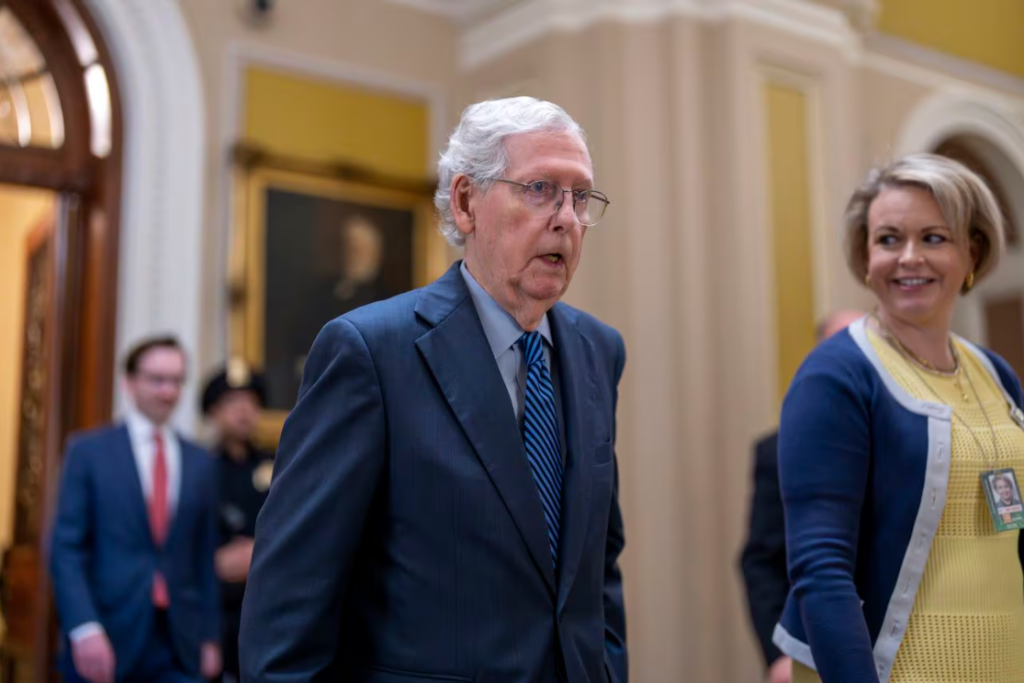【中美创新时报2024 年 4 月 24 日编译讯】(记者温友平编译)参议院周二(23日)通过了一项立法,将迫使 TikTok 的中国母公司在禁令的威胁下出售该社交媒体平台,美国立法者此举引起争议,预计将面临法律挑战并扰乱依靠短视频应用赚取收入的创作者的生活。美联社记者Mary Clare Jalonick、Stephen Groves 和 Farnoush Amiri 对此作了下述详细报道。
TikTok 立法被纳入向乌克兰和以色列提供外国援助的 950 亿美元一揽子计划的一部分,并以 79 比 18 获得通过。现在该法案已提交给乔·拜登总统,他在法案通过后立即发表声明称,他将于周三签署。
众议院共和党人上周决定将 TikTok 法案附加到高度优先的一揽子计划中,这有助于加快该法案在国会的通过,这是在与参议院进行谈判之后做出的,该法案的早期版本在参议院陷入僵局。该版本给了 TikTok 母公司字节跳动六个月的时间剥离其在该平台的股份。但它引起了一些主要立法者的怀疑,他们担心对于一项可能价值数百亿美元的复杂交易来说,窗口期太短。
修订后的立法延长了最后期限,给予字节跳动九个月的时间来出售 TikTok,如果出售正在进行中,还可能延长三个月。该法案还将禁止该公司控制 TikTok 的秘密武器:根据用户兴趣向用户提供视频的算法,并使该平台成为引领潮流的现象。
这项立法的通过是华盛顿两党长期以来对中国威胁和 TikTok 所有权的担忧的顶峰,TikTok 有 1.7 亿美国人使用。多年来,立法者和政府官员一直担心中国当局可能迫使字节跳动交出美国用户数据,或通过压制或推广 TikTok 上的某些内容来影响美国人。
“国会不会采取行动惩罚字节跳动、TikTok 或任何其他个别公司,”参议院商务委员会主席玛丽亚·坎特韦尔 (Maria Cantwell) 表示。“国会正在采取行动,防止外国对手进行间谍活动、监视、恶意行动、伤害弱势美国人、我们的军人和美国政府人员。”
该法案的反对者表示,中国政府可以通过其他方式轻松获取美国人的信息,包括通过交易个人信息的商业数据经纪人。对外援助计划包括一项条款,规定数据经纪人向朝鲜、中国、俄罗斯、伊朗或这些国家的实体出售或出租“个人身份敏感数据”是非法的。但它遇到了一些阻力,包括来自美国公民自由联盟的阻力,该联盟表示,该语言的表述过于宽泛,可能会席卷记者和其他发布个人信息的人。
许多 TikTok 措施的反对者认为,保护美国消费者的最佳方式是实施一项全面的联邦数据隐私法,该法针对所有公司,无论其来源如何。他们还指出,美国没有提供公开证据表明 TikTok 与中国当局共享美国用户信息,也没有表明中国官员曾经修改过其算法。
总部位于华盛顿的民主与技术中心副主任贝卡·布拉纳姆(Becca Branum)表示:“禁止 TikTok 将是一个非同寻常的步骤,需要非同寻常的理由。”该中心致力于数字权利的倡导。“延长资产剥离期限既不能证明对公众威胁的紧迫性,也不能解决该立法的根本宪法缺陷。”
中国此前曾表示反对强制出售 TikTok,这次也表示反对。长期以来一直否认自己构成安全威胁的 TikTok 也正在准备提起诉讼以阻止这项立法。
TikTok 美洲公共政策主管迈克尔·贝克曼 (Michael Beckerman) 在美联社获得的周六发给员工的备忘录中写道:“在法案签署阶段,我们将向法院提出法律质疑。”
“这是这个漫长过程的开始,而不是结束,”贝克曼写道。
该公司过去在法庭挑战方面取得了一些成功,但从未试图阻止联邦立法的生效。
去年 11 月,在该公司和五名使用该平台的内容创作者提起诉讼后,一名联邦法官阻止了蒙大拿州一项禁止 TikTok 在全州使用的法律。三年前,联邦法院阻止了时任总统唐纳德·特朗普发布的禁止 TikTok 的行政命令,此前该公司以该命令违反言论自由和正当程序权利为由提起诉讼。
特朗普政府随后促成了一项交易,让美国公司甲骨文和沃尔玛持有 TikTok 的大量股份。但出售从未成功。
今年再次竞选总统的特朗普现在表示,他反对潜在的禁令。
此后,TikTok 一直在与秘密的美国外国投资委员会就其未来进行谈判,该委员会是一个鲜为人知的政府机构,负责调查出于国家安全考虑的企业交易。
周日,字节跳动首席律师埃里希·安德森(Erich Andersen)告诉他的团队,他将辞去自己的职务。埃里希·安德森多年来一直主导与美国政府的谈判。
美联社获得的安徒生在一份内部备忘录中写道:“几个月前,当我开始反思过去几年的压力和未来的新一代挑战时,我认为现在是将接力棒交给新领导者的时候了。”他表示,辞职完全是他的决定,是几个月前与公司高层领导讨论后做出的。
与此同时,依赖该应用程序的 TikTok 内容创作者一直在努力让人们听到他们的声音。周二早些时候,一些创作者聚集在国会大厦前公开反对该法案,并举着写着“我是 TikTok 1.7 亿美国人之一”等标语的标语。
蒂芙尼·西安奇 (Tiffany Cianci) 是一名内容创作者,在该平台上拥有超过 14 万粉丝,并鼓励人们露面。她表示,她周一晚上从华盛顿地区的机场接创作者。有些来自远至内华达州和加利福尼亚州。其他人则连夜开车从南卡罗来纳州出发,或者从纽约州北部乘巴士前往。
西安奇表示,她相信 TikTok 是目前对用户来说最安全的平台,因为“德克萨斯计划”是 TikTok 耗资 15 亿美元的缓解计划,旨在将美国用户数据存储在科技巨头甲骨文拥有和维护的服务器上。
“如果我们的数据在 TikTok 上不安全,”她说。“我想问总统为什么上 TikTok。”
题图:参议院少数党领袖米奇·麦康奈尔走向他的办公室。J. SCOTT APPLEWHITE/ASSOCIATED PRESS
附原英文报道:
Senate gives final approval to aid for Ukraine, Israel, and Taiwan, sending long-delayed bill to Biden
By Mary Clare Jalonick, Stephen Groves and Farnoush Amiri The Associated Press,Updated April 24, 2024
WASHINGTON (AP) — The Senate passed legislation Tuesday that would force TikTok’s China-based parent company to sell the social media platform under the threat of a ban, a contentious move by U.S. lawmakers that’s expected to face legal challenges and disrupt the lives of content creators who rely on the short-form video app for income.
The TikTok legislation was included as part of a larger $95 billion package that provides foreign aid to Ukraine and Israel and was passed 79-18. It now goes to President Joe Biden, who said in a statement immediately after passage that he will sign it Wednesday.
A decision made by House Republicans last week to attach the TikTok bill to the high-priority package helped expedite its passage in Congress and came after negotiations with the Senate, where an earlier version of the bill had stalled. That version had given TikTok’s parent company, ByteDance, six months to divest its stakes in the platform. But it drew skepticism from some key lawmakers concerned it was too short of a window for a complex deal that could be worth tens of billions of dollars.
The revised legislation extends the deadline, giving ByteDance nine months to sell TikTok, and a possible three-month extension if a sale is in progress. The bill would also bar the company from controlling TikTok’s secret sauce: the algorithm that feeds users videos based on their interests and has made the platform a trendsetting phenomenon.
The passage of the legislation is a culmination of long-held bipartisan fears in Washington over Chinese threats and the ownership of TikTok, which is used by 170 million Americans. For years, lawmakers and administration officials have expressed concerns that Chinese authorities could force ByteDance to hand over U.S. user data, or influence Americans by suppressing or promoting certain content on TikTok.
“Congress is not acting to punish ByteDance, TikTok or any other individual company,” Senate Commerce Committee Chairwoman Maria Cantwell said. “Congress is acting to prevent foreign adversaries from conducting espionage, surveillance, maligned operations, harming vulnerable Americans, our servicemen and women, and our U.S. government personnel.”
Opponents of the bill say the Chinese government could easily get information on Americans in other ways, including through commercial data brokers that traffic in personal information. The foreign aid package includes a provision that makes it illegal for data brokers to sell or rent “personally identifiable sensitive data” to North Korea, China, Russia, Iran or entities in those countries. But it has encountered some pushback, including from the American Civil Liberties Union, which says the language is written too broadly and could sweep in journalists and others who publish personal information.
Many opponents of the TikTok measure argue the best way to protect U.S. consumers is through implementing a comprehensive federal data privacy law that targets all companies regardless of their origin. They also note the U.S. has not provided public evidence that shows TikTok sharing U.S. user information with Chinese authorities, or that Chinese officials have ever tinkered with its algorithm.
“Banning TikTok would be an extraordinary step that requires extraordinary justification,” said Becca Branum, a deputy director at the Washington-based Center for Democracy & Technology, which advocates for digital rights. “Extending the divestiture deadline neither justifies the urgency of the threat to the public nor addresses the legislation’s fundamental constitutional flaws.”
China has previously said it would oppose a forced sale of TikTok, and has signaled its opposition this time around. TikTok, which has long denied it’s a security threat, is also preparing a lawsuit to block the legislation.
“At the stage that the bill is signed, we will move to the courts for a legal challenge,” Michael Beckerman, TikTok’s head of public policy for the Americas, wrote in a memo sent to employees on Saturday and obtained by The Associated Press.
“This is the beginning, not the end of this long process,” Beckerman wrote.
The company has seen some success with court challenges in the past, but it has never sought to prevent federal legislation from going into effect.
In November, a federal judge blocked a Montana law that would ban TikTok use across the state after the company and five content creators who use the platform sued. Three years before that, federal courts blocked an executive order issued by then-President Donald Trump to ban TikTok after the company sued on the grounds that the order violated free speech and due process rights.
The Trump administration then brokered a deal that had U.S. corporations Oracle and Walmart take a large stake in TikTok. But the sale never went through.
Trump, who is running for president again this year, now says he opposes the potential ban.
Since then, TikTok has been in negotiations about its future with the secretive Committee on Foreign Investment in the United States, a little-known government agency tasked with investigating corporate deals for national security concerns.
On Sunday, Erich Andersen, a top attorney for ByteDance who led talks with the U.S. government for years, told his team that he was stepping down from his role.
“As I started to reflect some months ago on the stresses of the last few years and the new generation of challenges that lie ahead, I decided that the time was right to pass the baton to a new leader,” Andersen wrote in an internal memo that was obtained by the AP. He said the decision to step down was entirely his and was decided months ago in a discussion with the company’s senior leaders.
Meanwhile, TikTok content creators who rely on the app have been trying to make their voices heard. Earlier Tuesday, some creators congregated in front the Capitol building to speak out against the bill and carry signs that read “I’m 1 of the 170 million Americans on TikTok,” among other things.
Tiffany Cianci, a content creator who has more than 140,000 followers on the platform and had encouraged people to show up, said she spent Monday night picking up creators from airports in the D.C. area. Some came from as far as Nevada and California. Others drove overnight from South Carolina or took a bus from upstate New York.
Cianci says she believes TikTok is the safest platform for users right now because of Project Texas, TikTok’s $1.5 billion mitigation plan to store U.S. user data on servers owned and maintained by the tech giant Oracle.
“If our data is not safe on TikTok,” she said. “I would ask why the president is on TikTok.”

